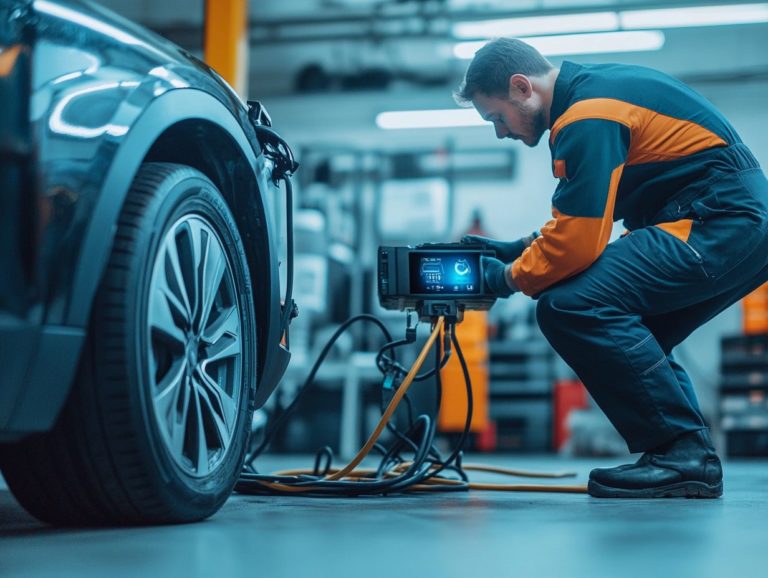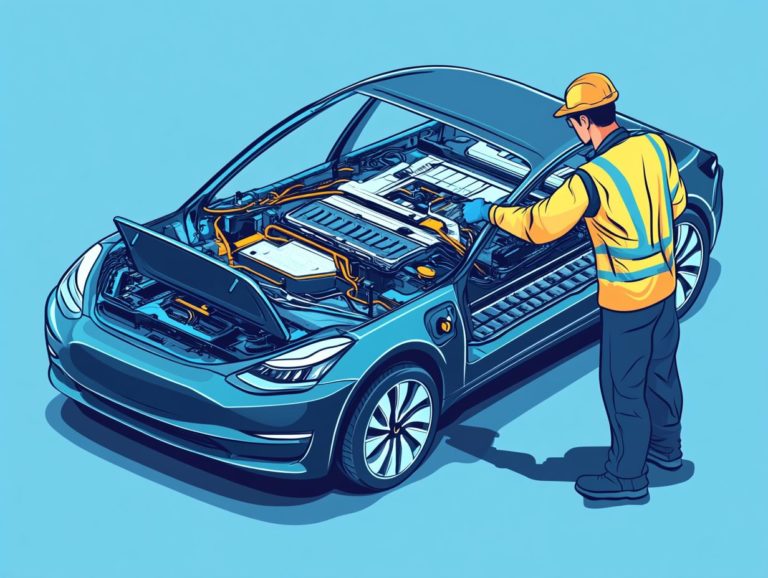the best tools for ev maintenance
The rise of electric vehicles (EVs) has revolutionized the automotive landscape, necessitating specialized maintenance tools to ensure they operate at their best.
If you re going green, knowing the right tools for EV maintenance is key. This article delves into the 15 best tools that will empower you and your mechanics to guarantee optimal performance and longevity for these cutting-edge vehicles.
Read on to discover the must-have tools you can’t afford to miss!
Contents
- Key Takeaways:
- 1. EV Charging Stations
- 2. Battery Monitoring Tools
- 3. Electric Vehicle Diagnostic Tools
- 4. EV Maintenance Software
- 5. Tire Pressure Monitoring Systems
- 6. Battery Reconditioning Tools
- 7. EV Tracking and Management Systems
- 8. Electric Vehicle Repair Guides
- 9. EV Battery Pack Balancers
- 10. Electric Vehicle Safety Equipment
- 11. Charging Cables and Adapters
- 12. EV Battery Dischargers
- 13. Diagnostic Scanners for EVs
- 14. EV Maintenance Apps
- 15. Electric Vehicle Tool Kits
Key Takeaways:
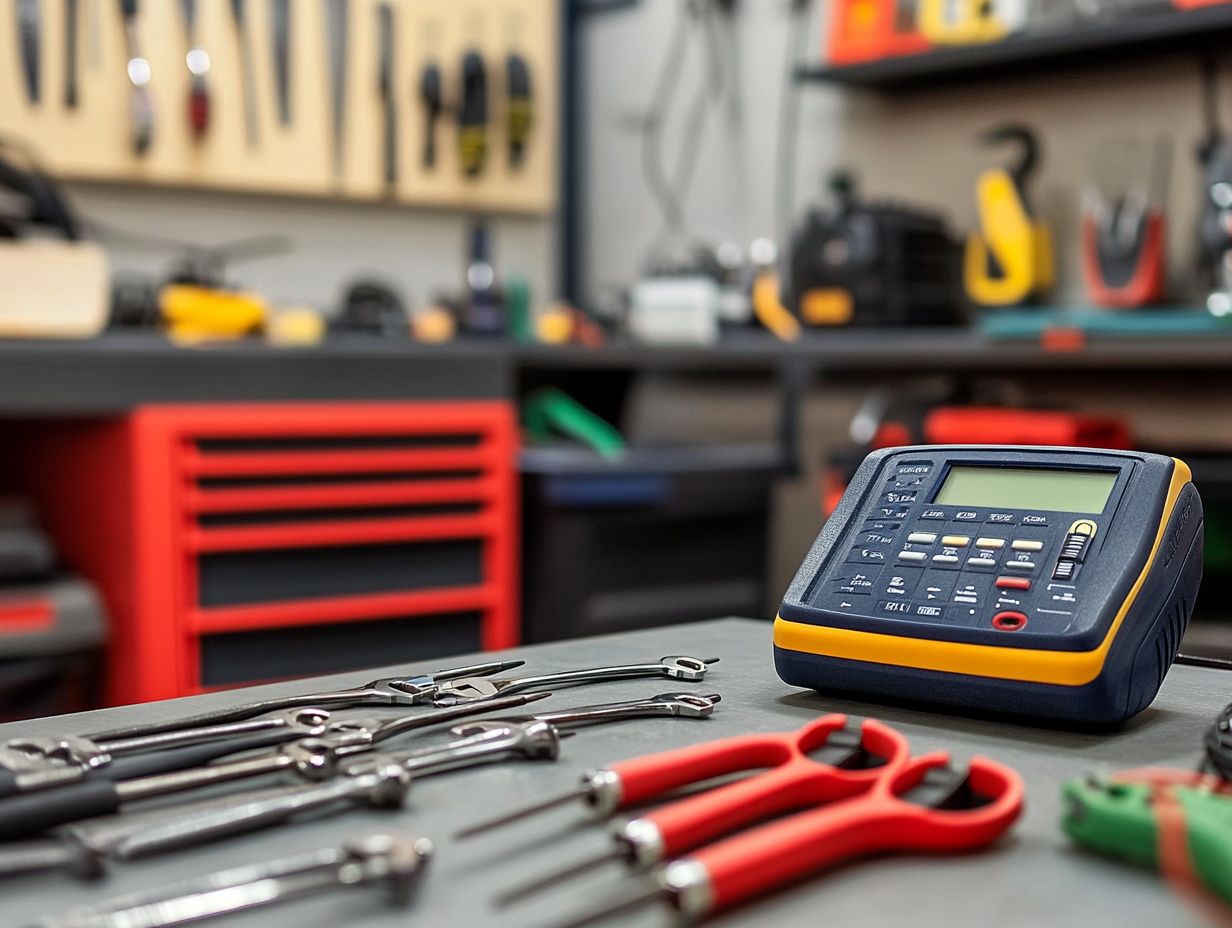
EV charging stations are essential for maintaining the battery life of your electric vehicle and should be easily accessible.
Battery monitoring tools can help track the health of your EV’s battery and detect any potential issues before they become major problems.
Electric vehicle diagnostic tools can help identify and troubleshoot any maintenance issues with your EV, allowing for timely and efficient repairs.
1. EV Charging Stations
As the electric vehicle (EV) market expands, the demand for accessible and efficient EV charging stations becomes increasingly vital not just for you as a consumer, but also for the entire automotive sector.
These stations are essential not only for keeping your electric vehicle charged but also for supporting the infrastructure necessary for batteries that power electric vehicles. They enhance your convenience while aligning with rigorous safety standards.
You ll encounter various types of EV charging stations:
- Level 1 chargers: Often found in homes, deliver the slowest charge but are perfect for overnight use.
- Level 2 chargers: Typically located in public areas like shopping centers and workplaces, provide quicker charging times.
- DC fast chargers: Usually found along highways, allow you to recharge rapidly for long-distance travel.
Safety plays a crucial role in the design and operation of these stations. Stringent regulations protect you and ensure the equipment operates optimally.
This commitment to safety simplifies EV servicing and maintenance. It also builds your confidence in choosing greener transportation.
2. Battery Monitoring Tools
Battery monitoring tools are essential for maintaining the health of lithium-ion batteries in electric vehicles. These tools give technicians the power to perform diagnostics and ensure optimal performance.
They provide real-time data on voltage, temperature, and current flow, making it easy to spot irregularities that may signal potential failures.
By leveraging advanced algorithms, these tools track charge cycles and overall battery health, offering valuable insights for preventative maintenance.
Regularly utilizing these monitoring tools is crucial for early issue identification and optimizing charging practices. This way, you can extend battery life and enhance your vehicle’s performance.
Proactive care leads to improved efficiency and reliability essential for both personal and commercial EV operations.
3. Electric Vehicle Diagnostic Tools
Electric vehicle diagnostic tools are essential for servicing your EV. These tools provide critical equipment, like fault detection computers and multimeters, allowing you to pinpoint issues within high-voltage components and ensure reliable vehicle performance.
These advanced tools use smart technology and real-time data analysis to evaluate electric drive systems, battery management units, and charging stations. For example, a fault detection computer can interface with the vehicle s onboard systems to retrieve error codes and operational data, helping you diagnose problems with precision.
Multimeters measure electrical parameters like voltage, current, and resistance, helping you monitor the health of various electrical components. Their importance cannot be overstated; they are crucial for maintaining safety while maximizing vehicle efficiency and longevity.
In a world increasingly driven by electric mobility, understanding electrical currents is not just beneficial it’s essential.
4. EV Maintenance Software
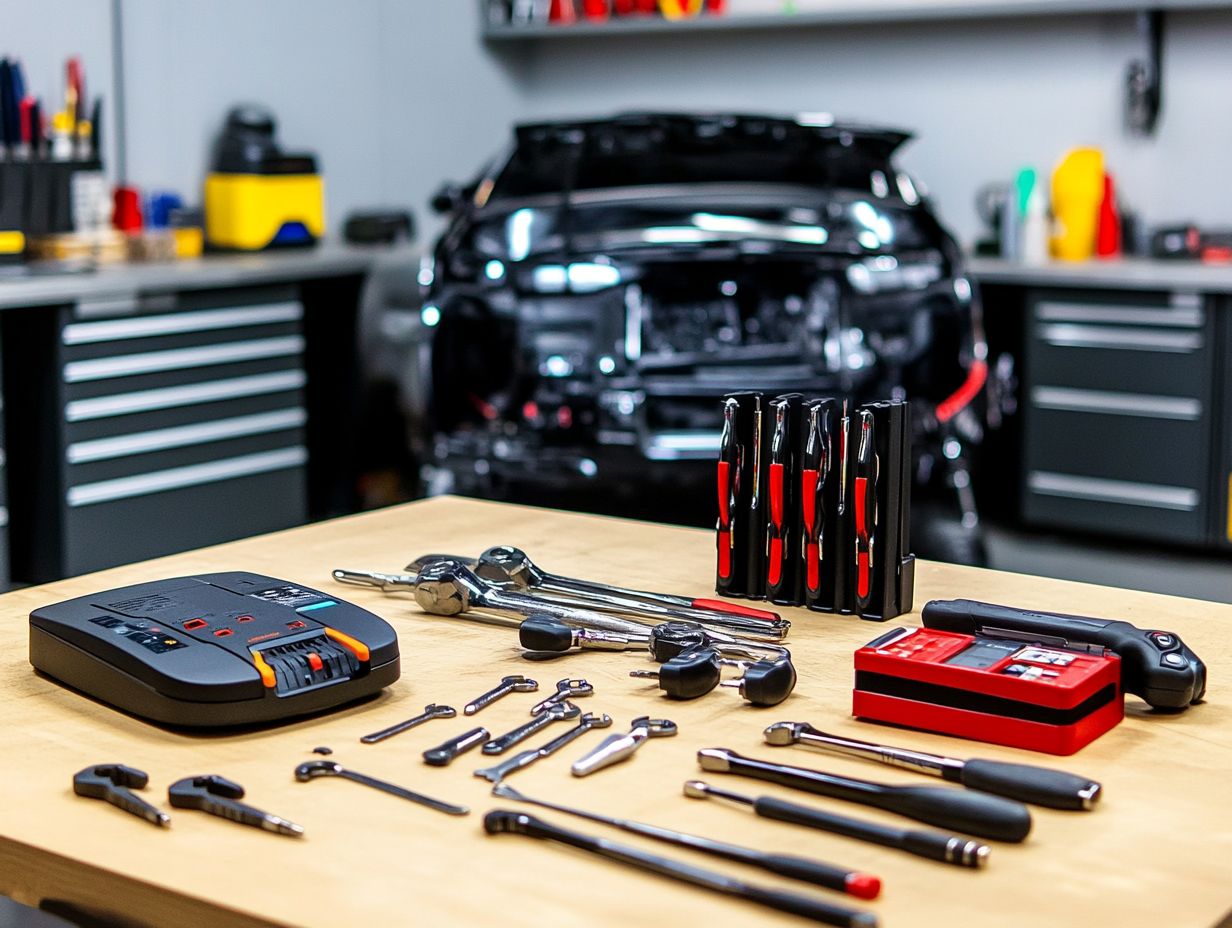
EV maintenance software is transforming the automotive landscape. It streamlines various aspects of EV servicing, allowing you to manage maintenance procedures efficiently and perform diagnostics accurately.
This innovative tool integrates with advanced diagnostic equipment, providing real-time insights into vehicle performance and health. By tracking maintenance history meticulously, you can anticipate issues before they escalate into significant problems.
Features like automated scheduling serve as reminders for upcoming tasks, enhancing your workflow. The robust reporting capabilities ensure compliance with safety regulations.
This technology optimizes your servicing processes and extends the lifespan of vehicles, fostering trust and satisfaction among customers in the evolving electric vehicle market.
5. Tire Pressure Monitoring Systems
Tire pressure monitoring systems (TPMS) are vital for your electric vehicle. They ensure that optimal tire maintenance is consistently met, enhancing safety and extending your vehicle’s lifespan.
These systems continuously track tire pressure and alert you to fluctuations. This allows for timely adjustments that can prevent blowouts and accidents. In electric vehicles, maintaining proper tire pressure is crucial not just for safety, but also for energy efficiency.
Under-inflated tires create more rolling resistance, diminishing your battery range and overall performance.
By incorporating TPMS, you promote proper tire health, contributing to your vehicle’s longevity and reducing costly repairs. Being proactive about tire pressure enhances your driving experience and the sustainability of your electric vehicle.
6. Battery Reconditioning Tools
Battery reconditioning tools are essential for extending the lifespan of lithium-ion batteries in electric vehicles. They use techniques like battery health tools to ensure the reconditioning process is safe and effective.
These tools often come with advanced diagnostic software that analyzes the battery s current state, enabling you to develop tailored reconditioning strategies. They also include temperature regulation devices to maintain optimal conditions and prevent overheating.
By pinpointing and addressing individual cell issues, these tools enhance overall battery capacity and performance. The reconditioning techniques you utilize improve battery longevity and contribute to sustainability in the electric vehicle sector.
By reducing waste and promoting the reuse of materials, you play a crucial role in lessening the environmental impact associated with battery production and disposal.
7. EV Tracking and Management Systems
EV tracking and management systems are becoming increasingly vital in the automotive sector. They offer real-time insights into electric vehicle performance and facilitate effective communication protocols for superior fleet management and maintenance.
These systems utilize advanced data tracking to monitor crucial metrics such as battery health, charging status, and energy consumption. By analyzing this data, you can spot patterns and make informed decisions about vehicle utilization and charging strategies.
This proactive approach boosts your operational efficiency and allows you to schedule maintenance tasks before any issues arise, minimizing downtime.
The integration of analytics plays a significant role in extending the lifespan of your electric vehicles. It enables timely interventions and optimizations that enhance longevity and sustained performance.
8. Electric Vehicle Repair Guides
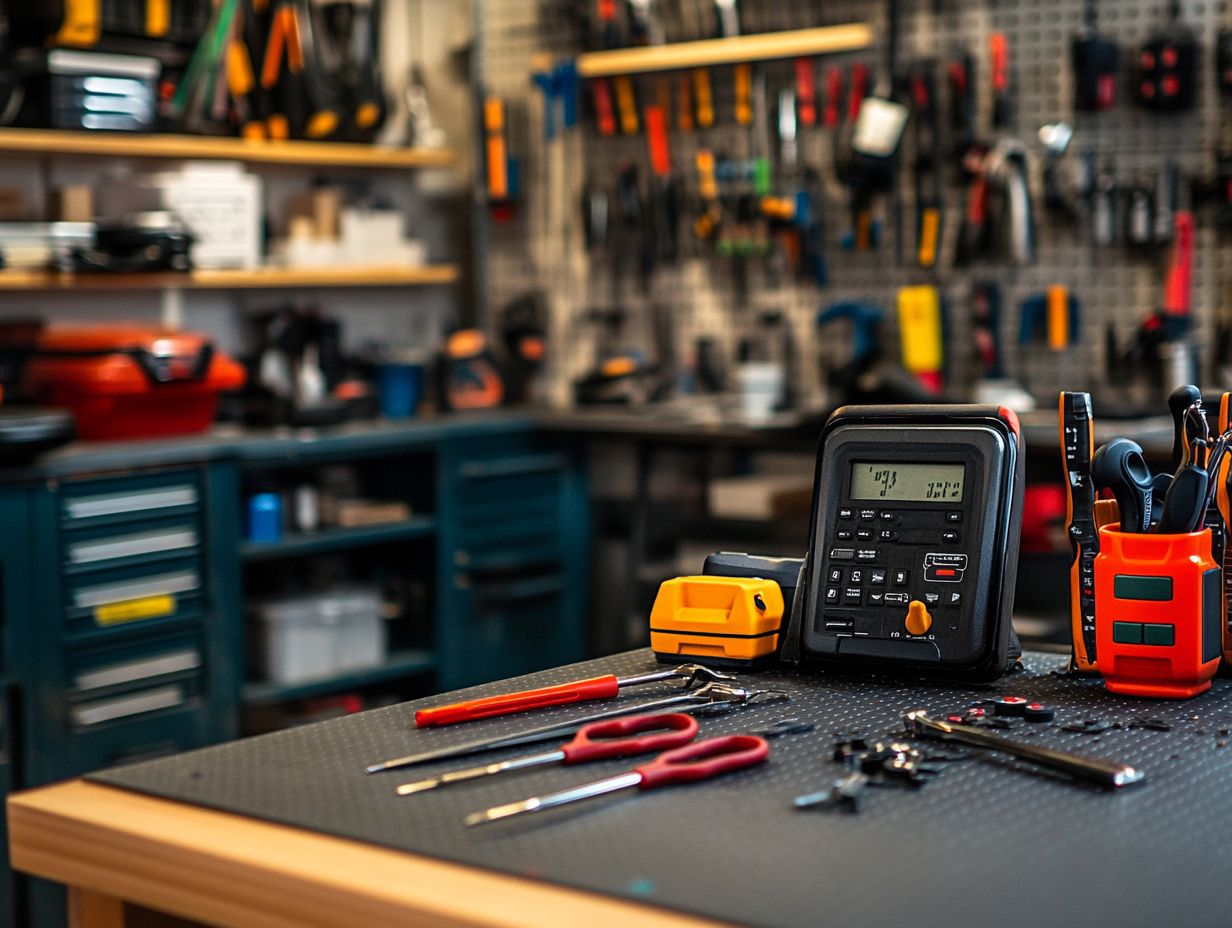
Electric vehicle repair guides are invaluable resources for technicians. They offer comprehensive insights into EV servicing, necessary automotive tools, and standardized maintenance procedures that ensure safe and effective repairs.
These guides explore the unique components of electric vehicles, including battery management systems, electric motors, and regenerative braking features.
You ll often find troubleshooting tips for common issues such as battery charging problems, power loss, or software glitches. Each guide provides step-by-step instructions to help you diagnose and resolve these challenges.
For example, when confronted with a persistent warning light on the dashboard, the guide empowers you to effectively utilize diagnostic tools, interpret error codes, and implement the right fixes.
By mastering these intricacies, you can enhance your repair speed and accuracy. This ultimately leads to a more efficient service experience for EV owners.
9. EV Battery Pack Balancers
EV battery pack balancers are essential tools that elevate the performance and safety of lithium-ion battery packs. They ensure that every cell within the pack operates uniformly and efficiently an absolute necessity for high-voltage components.
These balancers continuously monitor voltage levels across each cell. When they detect discrepancies, they redistribute the charge to equalize the energy stored in each cell. This process extends the overall lifespan of the battery and enhances its efficiency during both charging and discharging cycles.
The importance of maintaining a balanced battery cannot be overstated. It helps mitigate risks associated with overheating and prevents premature failure, bolstering the reliability of electric vehicles.
The technology behind these balancers is impressive. It utilizes sophisticated algorithms and sensors that dynamically respond to changes in battery conditions. They play a crucial role in the broader landscape of electric vehicle operation and performance.
10. Electric Vehicle Safety Equipment
If you service electric vehicles, having the right safety gear is essential! Electric vehicle safety equipment is vital for adhering to safety standards while working on high-voltage components.
It’s crucial for anyone involved in servicing electric vehicles to be equipped with a comprehensive range of protective gear.
Key items to consider include:
- Personal protective equipment like gloves specifically designed to handle electrical hazards
- Dielectric boots, which protect against electrical shocks
- Face shields to protect against potential arc flashes
You should also make it a priority to engage in regular training sessions. Staying updated on industry regulations and standards is vital for establishing a safe working environment. Regular training reinforces best practices, ensuring safety remains at the forefront of your operations and fostering a robust culture of risk management in your workplace.
11. Charging Cables and Adapters
Charging cables and adapters play a crucial role in the electric vehicle ecosystem. They allow you to connect to various charging points while adhering to safety standards that protect both you and your vehicle s systems.
With a range of options available including Type 1, Type 2, CCS, and CHAdeMO systems it s essential for you to familiarize yourself with your specific model’s requirements. Choosing the right charging cable or adapter not only ensures efficient charging but also enhances safety, helping to prevent potential damage to your vehicle s battery or electronics.
Compatibility is paramount. Using the wrong equipment can lead to slower charging times or, even worse, interruptions that could leave you stranded. Understanding your options and ensuring the right match is vital to optimizing your electric driving experience.
12. EV Battery Dischargers
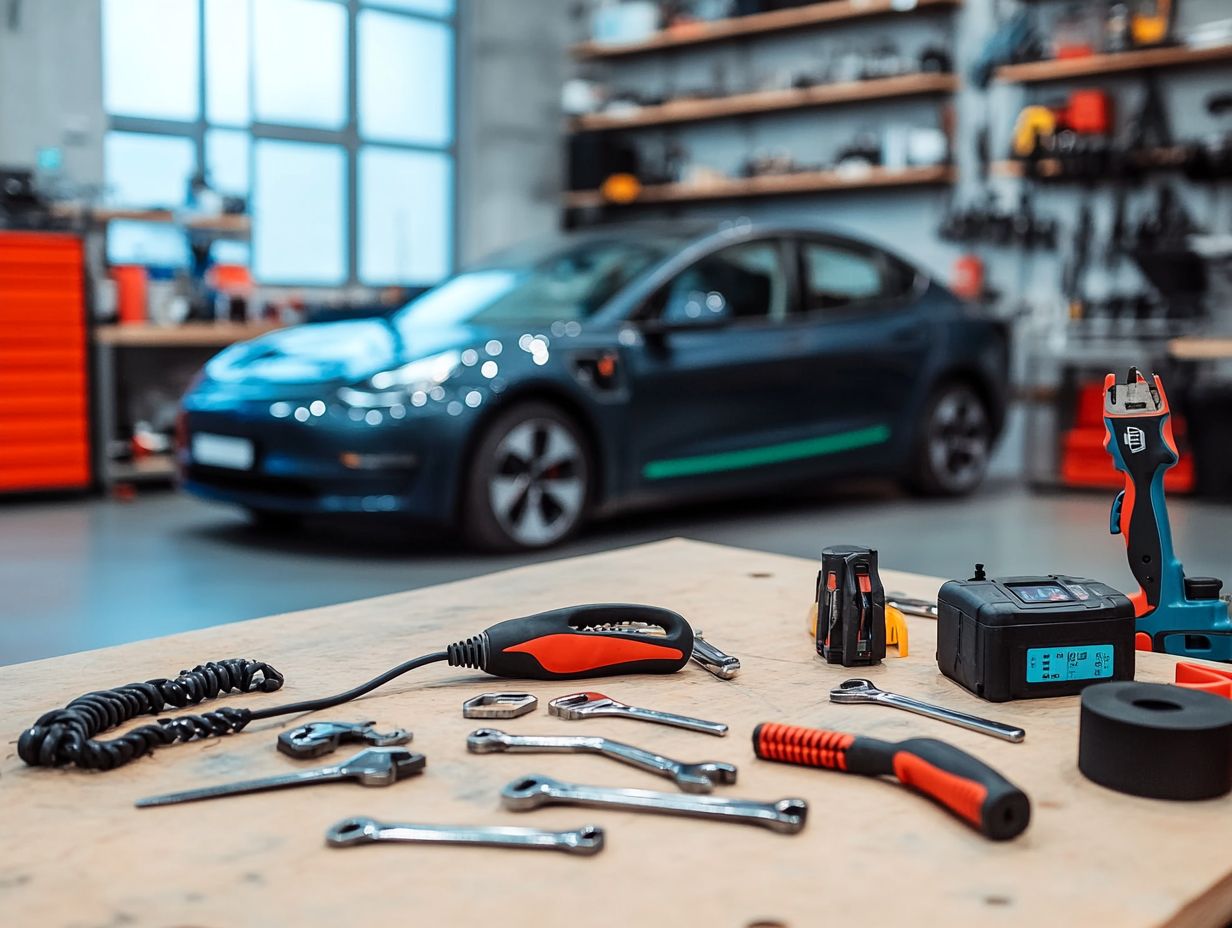
EV battery dischargers are essential automotive tools made for checking vehicle issues. They allow you to safely discharge lithium-ion batteries for thorough analysis and maintenance.
These tools are pivotal in ensuring the longevity and reliability of electric vehicle power systems. By helping to safely release battery power, they empower you to assess battery health, pinpoint potential issues, and optimize performance effectively.
Using EV battery dischargers properly is essential, as it significantly mitigates the risks associated with over-discharge and thermal events. Always prioritize safety by following manufacturer guidelines, donning protective gear, and diligently monitoring the battery’s condition throughout the testing process.
Implementing best practices, such as working in a well-ventilated area and establishing emergency protocols, can enhance the safety and efficacy of your maintenance routines.
13. Diagnostic Scanners for EVs
Diagnostic scanners for electric vehicles are essential tools in your arsenal for pinpointing issues within the vehicle’s systems. Leveraging advanced fault detection computer technology, these devices facilitate efficient diagnostic processes.
With their sophisticated capabilities, you can identify a broad range of faults, from battery malfunctions to complications within the regenerative braking systems. By seamlessly integrating with other diagnostic tools, they offer you a comprehensive overview of the vehicle’s health, allowing technicians to swiftly tackle any concerns.
Enhanced data analytics help scanners identify problems in real-time. They can also predict potential failures, significantly elevating your preventative maintenance game. This efficiency in diagnosing electric vehicles leads to reduced downtime for your customers and promotes longer vehicle lifespans, making these scanners absolutely crucial in the world of modern EV servicing.
14. EV Maintenance Apps
EV maintenance apps are revolutionizing the way you approach servicing electric vehicles, offering you convenient access to maintenance procedures and diagnostics right from your mobile device.
These cutting-edge tools empower you to take charge and easily schedule appointments, ensuring that vehicle owners remain informed about necessary maintenance checks and significantly reducing the chances of unexpected breakdowns.
By allowing you to track service history, these apps help you maintain a comprehensive record of each vehicle’s health, facilitating well-informed decisions during repairs.
Many of these applications integrate flawlessly with diagnostic tools, providing you with real-time data on vehicle performance. This seamless integration streamlines the entire servicing process and enhances your efficiency, ultimately leading to improved vehicle performance and heightened customer satisfaction.
Explore your options today!
15. Electric Vehicle Tool Kits
Electric vehicle tool kits are essential for any technician in the automotive sector. They provide a comprehensive selection of tools tailored for the unique maintenance needs of electric vehicles, including insulated options.
These kits typically include essential items such as:
- Multimeters (tools that measure electrical current) for measuring voltage
- Torque wrenches for precise adjustments
- Battery terminal cleaning tools to ensure optimal performance
Insulated screwdrivers and pliers are vital for safely handling high-voltage components, effectively reducing the risk of electric shock. Every tool in these kits is designed with the specific requirements of electric vehicle maintenance in mind, facilitating proper servicing while prioritizing safety.
Having the right tools boosts efficiency and ensures adherence to manufacturer guidelines, ultimately extending the lifespan of these advanced vehicles. Equip technicians with specialized tools to foster a safe and productive work environment. To learn more about ensuring optimal performance, check out the future of electric vehicle maintenance. Get your toolkit ready today to ensure your EV runs smoothly!
Frequently Asked Questions
What are the best tools for EV maintenance?
The best tools for EV maintenance may vary depending on your electric vehicle’s make and model. However, some commonly used essential tools include a multimeter, tire pressure gauge, brake bleeder, and the essential guide to EV maintenance battery load tester.
Do I need specialized tools for EV maintenance?
While some specialized tools can be beneficial for certain tasks, you can generally use the same tools as for traditional gas-powered vehicles. It’s a good idea to understand how electric vehicles work before you dive into maintenance.
Are there any specific tools for EV battery maintenance?
Yes, specific tools designed for EV battery maintenance include battery desulfators and battery capacity testers. These tools can help prolong your EV battery’s lifespan and ensure it functions at its best.
Can I perform EV maintenance without any tools?
Some simple tasks, like checking tire pressure or cleaning your EV, can be done without any tools. However, most maintenance tasks will require at least a few basic tools. It’s advisable to have a set of tools specifically for your EV to ensure proper maintenance and learn about essential EV maintenance tips to avoid any potential damage.
Where can I purchase the best tools for EV maintenance?
You can purchase tools for EV maintenance from various sources, such as online retailers, hardware stores, and specialized EV maintenance shops. Research and compare prices and quality before making a purchase to ensure you get the best tools for your needs, including tips for keeping your EV in top shape.
Are there any maintenance tasks I can do myself without any tools?
Yes, some maintenance tasks can be done without specialized tools, such as checking and topping off fluid levels or cleaning the exterior of your EV. However, for more significant maintenance tasks, it’s recommended to have the necessary tools and knowledge to ensure proper and safe maintenance.


